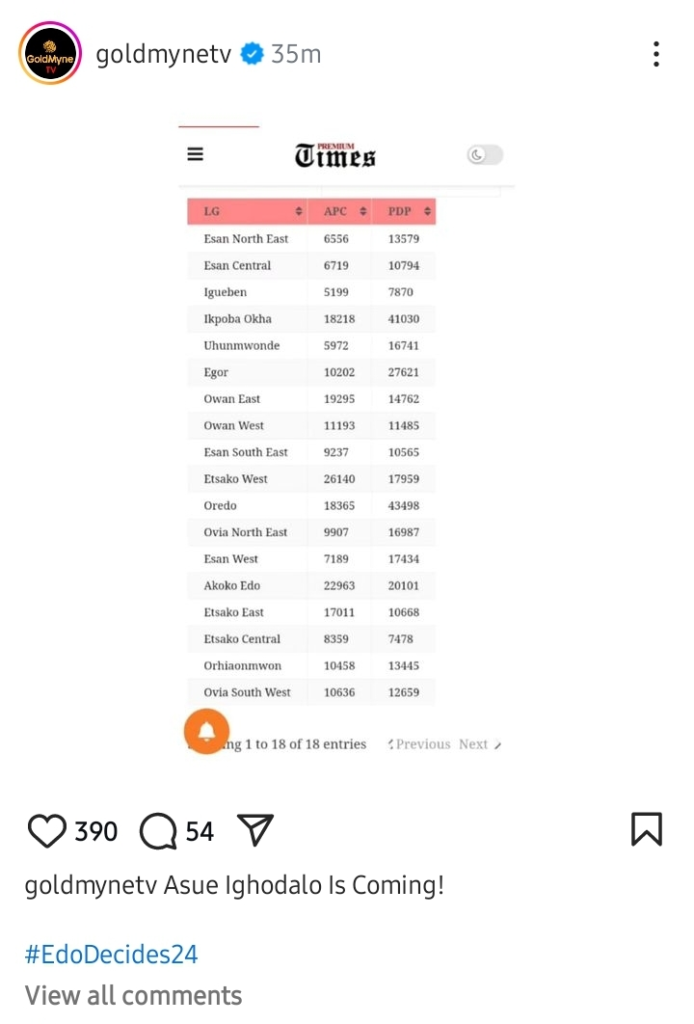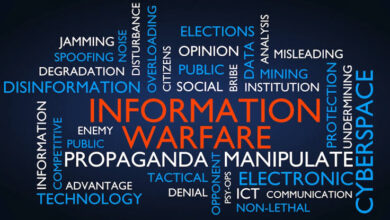The Battle for Truth in Edo’s Governorship Election – How Misinformation Sabotaged the Democratic Process

BY: Mustapha Lawal
The Edo State governorship election held on Saturday, September 21, 2024, was more than just a test of political influence and voter preferences. It became a battleground for truth itself, as political actors and their affiliates deployed an arsenal of misinformation tactics designed to undermine the integrity of the electoral process.
As the dust settles, it is evident that the deliberate spread of falsehoods was not just a by-product of electoral competition but a well-coordinated strategy to manipulate public perception and disrupt the sanctity of the vote.
In the age of social media, the reach and speed of misinformation have amplified its ability to distort reality. Leading up to and during the election, voters were bombarded with a litany of false claims, doctored images, and misleading narratives that blurred the lines between fact and fiction.
The implications were severe—misinformation not only confused voters but also threatened to erode public confidence in the election’s outcomes. This article reflects on the role of misinformation in the Edo 2024 election, focusing on key instances where falsehoods were deliberately weaponized and how they impacted the electoral process.
Misinformation as a Political Tool
Across Africa, misinformation has become an increasingly potent tool in the hands of political actors seeking to sway elections. In Edo State, this trend was glaringly evident. From fake endorsements to fabricated legal proceedings, the 2024 governorship election was awash with misinformation designed to weaken political opponents, intimidate voters, and delegitimise the election’s credibility. These tactics, deployed with precision by political actors, took advantage of the hyper-connected nature of social media to manipulate voters in real time.
One of the most pervasive falsehoods circulated ahead of the election was the claim that Labour Party candidate Olumide Akpata had withdrawn from the race. This claim, which appeared on multiple social media platforms, was quickly debunked. Akpata himself had to issue a press statement denying the rumours, reaffirming his commitment to the election. The false narrative appeared to be an attempt to sway undecided voters away from Akpata by creating the illusion of a fragmented opposition.
Another form was a viral claim accusing the sitting governor, Godwin Obaseki, of attempting to bribe the Independent National Electoral Commission (INEC) with $5 million. This allegation, which gained traction on Facebook, was based on the report that Obaseki had in the wee hours of Sunday, September 22, 2024, arrived at the head office of the Independent National Electoral Commission (INEC) in the State. However, reports further alleged that the governor walked into the office of the Resident Electoral Commissioner (REC), Anugbum Onuoha for a meeting but was forced out of the premises by the DIG Frank Mba.
There were no credible reports that Obaseki offered the INEC REC $5 million as neither the police nor the INEC REC made any assertion to that effect. Despite the absence of evidence, the narrative was a potent example of how disinformation can be used to manipulate public sentiment and paint political figures in a negative light, particularly during sensitive electoral periods.
Such baseless accusations are designed to undermine trust in electoral institutions and cast doubt on the integrity of candidates, thereby disrupting the democratic process The fact that they gained such widespread traction highlights the vulnerability of the public to disinformation.
Weaponizing Legal Disinformation
In addition to the claim about Akpata, another misinformation campaign targeted Monday Okpebholo, the candidate for the All Progressives Congress (APC) and eventually declared winner of the election. A false narrative spread across social media that an Abuja Court had disqualified Okpebholo from the race over age falsification. This claim was fact-checked and found to be false, but not before it had already gained momentum. Okpebholo’s campaign was forced to go on the defensive, issuing denials and clarifying the candidate’s legal standing. While the narrative was swiftly debunked, its spread demonstrated how legal disinformation could be used to cast doubt on a candidate’s viability, even if temporarily.
This tactic of leveraging fabricated legal documents and false court rulings represents a disturbing trend in modern elections, where fake news is not limited to social media gossip but can take the form of sophisticated forgery. As was seen in Edo, political actors can easily use disinformation to distract and destabilize their opponents, forcing them to address spurious claims rather than focus on policy or campaign strategy.
Fake Endorsements and Fabricated Withdrawals
Perhaps one of the most insidious forms of misinformation that emerged during the Edo election was the false claim that PDP candidate Asue Ighodalo had stepped down in favour of Labour Party’s Olumide Akpata. This rumour, which was supported by a forged letter purportedly from the PDP, gained significant traction in the hours leading up to the election. The PDP quickly debunked the letter, labelling it as a fake and accusing the opposition of using dirty tactics to create confusion among voters.
Transparency in the Collation Process
Concerns about the transparency of the results collation process during the 2024 Edo Governorship Election were raised by several election observer groups. In their joint statement, civil society organizations, including Yiaga Africa, CDD West Africa, and the Nigerian Civil Society Situation Room expressed alarm over reports of disruptions at various ward and local government collation centres, such as Ikpobba/Okha, Etsako West, Egor, and Oredo LGAs. These disruptions included intimidation of INEC officials and attempts to manipulate the results, violating provisions of the Electoral Act and INEC guidelines. The observers called on INEC to invoke its authority under Section 65 of the Electoral Act 2022 to review any instances where results were not declared voluntarily or were inconsistent with electoral laws. They further urged security agencies to refrain from interference, ensuring full access to collation centres for party agents, media, and observers. The statement underscored the importance of the role of security agencies in safeguarding the process without compromising the transparency or credibility of the election.
Fake Electoral Results


(Screenshot of a false result circulating and a debunk of the result)
As voting began and continued through the day on September 21, 2024, another wave of misinformation hit the airwaves. False election results began circulating, suggesting premature outcomes favouring specific candidates. These false results were not only inaccurate but were deliberately crafted to give the impression that certain candidates had an insurmountable lead before the official count had even begun.
This is a classic example of how misinformation is used to psychologically prime voters, creating a false sense of inevitability around a candidate’s victory and discouraging voter participation or confidence in the final outcome. Fact-checkers were quick to debunk these fabricated results, pointing out that the official results would only be announced by the Independent National Electoral Commission (INEC). However, the damage caused by these fake results was significant, as they contributed to a climate of confusion and distrust, with some voters questioning the legitimacy of the eventual winner.
Electoral Violence and Doctored Images
In addition to false endorsements and fake results, misinformation concerning electoral violence also became rampant. Multiple doctored images and videos circulated online, purporting to show disruptions at polling stations and violent clashes between political thugs in key parts of Benin City. One particularly viral claim suggested that voting was completely disrupted in several wards due to clashes between rival political groups. Fact-checkers, including FactCheckAfrica and other reputable organizations, found that many of these images were either doctored or taken out of context, with some being from unrelated events in previous years or from different countries entirely.
The use of fake violence reports was a calculated move aimed at disenfranchising voters by creating a climate of fear. When voters believe that polling stations are unsafe, they are less likely to turn out and vote, which can skew the election results in favor of those who are able to mobilize their supporters despite the misinformation.
The Growing Trend of Vote Buying
Another form of electoral malpractice that was exposed during the Edo 2024 election was vote buying. Images and videos of voters receiving payments after casting their votes at Eguare Primary School in Esan Central went viral. While vote buying is not a new phenomenon in Nigerian elections, its persistence in 2024 is a reminder of the enduring challenge of curbing financial incentives in exchange for votes. Misinformation played a role here as well, as false narratives circulated accusing specific parties of engaging in vote buying, when in reality the practice was more widespread.
The Role of Critical Institutions
While political actors were busy deploying misinformation, critical institutions like INEC, security agencies, and civil society organizations faced significant challenges in combating the spread of false information. INEC tried to reassure the public by regularly updating voters with accurate information, but the sheer volume of misinformation made it difficult to control the narrative. Civil society organizations and fact-checkers played a critical role in debunking falsehoods as they emerged. However, their efforts were often hampered by the speed at which misinformation spread, particularly on platforms like WhatsApp and Facebook, where fact-checking efforts were less visible.
Conclusion: A Call for Greater Vigilance
The Edo 2024 governorship election is a case study in how misinformation can be weaponized to undermine democratic processes. From false claims of withdrawals to doctored election results, political actors used misinformation as a tool to gain an advantage, often to the detriment of voter confidence and the credibility of the election itself.
As Nigeria looks forward to future elections, it is crucial that voters, institutions, and civil society organizations remain vigilant. Fact-checking has never been more critical in ensuring that elections reflect the will of the people rather than the machinations of those who seek to manipulate it. In the battle for truth, misinformation may have been a powerful weapon in Edo, but with greater public awareness and stronger institutional responses, it does not have to be the victor.




